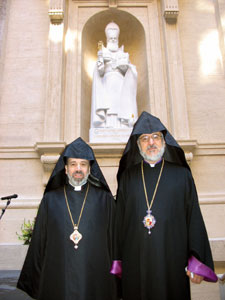
Since the thread on defining Anglicanism is winding down I plan to turn to the issue of papal primacy -- undoubtedly a fair issue to raise in light of Anglicanism's claim to a catholicity grounded in the understanding and practice of the undivided church of the first millennium. It is beyond dispute that the Church Catholic of the first millennium, both East and West, acknowledged the primacy of the Bishop of Rome as primus inter pares; and a consistent Anglican Catholic will not only acknowledge this, but is compelled to grapple with the issue.
In preparation for this I have been re-reading a book I picked up in England some ten years ago entitled Orthodox Perspectives on Mission (1992) by Archbishop Aram Keshishian, at the time Primate of the Armenian Apostolic Church in Lebanon. The good Archbishop has a lot of insightful things to say about the dialogue taking place between his communion and the Roman Church and the place of papal primacy in any future reunion.
As an Anglican I find myself strangely in sympathy with the Oriental Orthodox (non-Chalcedonian, a.k.a. Monophysite) churches -- a feeling almost akin to a kinship with them. Now before I'm misunderstood let me reassure my readers that this kinship has nothing to do with an affinity of Christological perspectives. Rather I suspect that the reason for this felt-kinship is that the history of controversy, separation, and mutual recrimination between the Oriental Orthodox and Eastern Orthodox (i.e., Chalcedonian) communions in the East mirrors in many respects Anglicanism's relationship with the Roman communion in the West. As a result of similar "black sheep of the family" circumstances, the non-Chalcedonians, like Anglicans, have been compelled to take a hard look at the sad history of discord within the body of Christ and, in my opinion, soberly acknowledge what neither of the two largest branches of the Christian Church have been willing to acknowledge, namely that the divisions in the Church of Christ on earth are real, not apparent.
I leave you with a quote from the good Archbishop that resonates with my own thoughts expressed here in my blog:
"...Unity is not a man-made reality, but a gift of God which can only be received, and, if lost, rediscovered. Therefore, the unity of the church is neither merger nor theological consensus, but the restoration of eucharistic communion in the apostolic faith.
"With such an understanding of unity the Oriental Orthodox Churches believe that the one church has never ceased to exist. The unity of the church has been only obscured due to historical circumstances. The Oriental Orthodox Churches understand themselves as faithfully continuing the apostolic tradition of the one undivided church. They believe, however, that the fullness of the apostolic communion 'has always to be manifested more fully, and this in company with all other Christians at work in the world.'"
--Orthodox Perspective on Mission, p. 85.

3 comments:
I think Joseph's challenge got us Anglicans sweating a bit, and that is all for the good; it forced us to face the historical ambiguities of our own claims to catholicty and gave us pause to consider what the "fullness" of catholicity could possibly mean, post AD 1054.
These words from Abp. Keshishian do sound remarkably Anglican, pointing as they do to the "historical circumstances" that have "obscured" the Church's unity. These "historical circumstances", in fact, are the very things that cause me to scratch my head. How, in heavens name, could catholic fullness exist anywhere on this earth, in the face of our sad divisions?
-Mark
"The Oriental Orthodox Churches understand themselves as faithfully continuing the apostolic tradition of the one undivided church. They believe, however, that the fullness of the apostolic communion 'has always to be manifested more fully, and this in company with all other Christians at work in the world.'"
Those words sound remarkably like the sentiments of an Anglican revivalist, John Wesley. "If your heart is right with God as my heart, give me your hand." I would commend to any contemporary Anglican his sermon "The Catholic Spirit."
Good comments, both of you.
One thing I caution those of my correspondents who have, or are thinking about, crossing the Tiber or the Bosphorus is that they take a good hard and honest look at the divisions that occured PRIOR to the great schism of 1054. On this side of 1054 we have a tendency to romanticize the age of the "undivided church." It was not undivided, nor are the issues that separated Christian churches in the first millennium, and continue to keep them separate, resolved by a simple and convenient adherence to the ecumenical councils (whether we ascribe to 3, 4, 7, or 12!) Councils are only ecumenical to the parties who win. My next entry, I believe, demonstrates how problematic it is simply to dismiss outright the Oriental Orthodox churches as "heretics."
Post a Comment